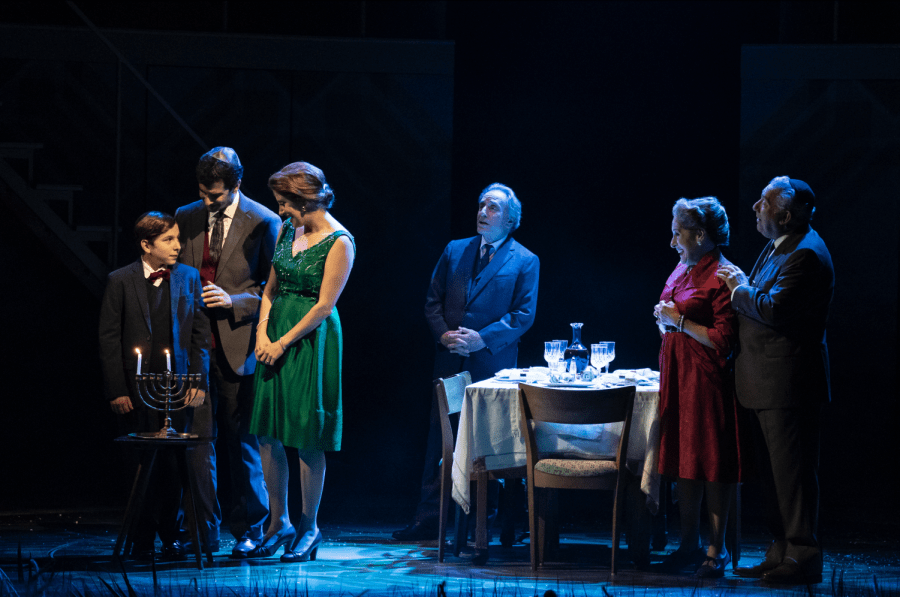‘Caroline, or Change’ Offers Its Two Cents on the Human Condition
Roundabout Theatre Company revival portrays a story of resistance, family and race relations
COURTESY OF JOAN MARCUS
In a sea of commercialized musicals on Broadway, “Caroline, or Change” stands out as a masterclass of performance and production design.
November 17, 2021
“Change come, fast and change come slow, but change come, Caroline Thibodeaux.” Lyrics like this permeate throughout the Roundabout Theatre Company’s revival of “Caroline, or Change,” offering a sense of comfort in the current turbulent state of society. Transferring from a critically acclaimed run on the West End, “Caroline, or Change” encourages Broadway audiences to embrace life and the changes that come with it.
The story follows the Gellmans, a Jewish family, and their Black maid Caroline Thibodeaux (Sharon D. Clarke) in 1963 Louisiana. The Gellmans, consisting of young Noah (Gabriel Amoroso), his father Stuart (John Cariani) and his stepmother Rose (Caissie Levy), struggle to connect after the death of Noah’s mother.
While they bicker in the house above, Caroline spends most of her day working in the Gellman’s basement, contemplating her struggles as a single mother of four. When Rose tells Caroline that she is allowed to keep any spare change she finds doing the laundry, Caroline is sent into a crisis reflecting on her stagnant life as a maid in the changing world outside of her basement.
Offering this contrast between reality and fiction helps emphasize the idea that we can all find the extraordinary in what appears to be mundane and adds a layer of playfulness to otherwise heavy themes.
On her journey, Caroline is forced to grapple with not only her internal strife but the ever-evolving era of the ’60s. The show notes the assassination of JFK, the toppling of a Confederate statue and the civil rights movement in the South. Through the collaboration between musician Jeanine Tesori and lyricist Tony Kushner, “Caroline, or Change” blends a series of musical genres, such as blues, Motown, spirituals and traditional Jewish folk melodies.
Together, Tesori and Kushner comment on larger societal issues through their songs while also implementing a sense of magical realism throughout the musical. Throughout Caroline’s life, the objects around her are personified, such as her radio transforming into a Greek choir akin to that of the Muses in Disney’s “Hercules.” Offering this contrast between reality and fiction helps emphasize the idea that we can all find the extraordinary in what appears to be mundane and adds a layer of playfulness to otherwise heavy themes.
Despite being a period piece, the revival manages to modernize its timeless themes through its production design. The human characters are dressed in muted everyday wear, whereas the anthropomorphized appliances’ costumes are surrealistic expressions of bright colors and sparkling fabrics — they appear like something you would picture in a sci-fi novel.
Balancing the gritty realism with an idealized future is further explored with the changing structure of the atmosphere. Whenever Caroline or younger characters sing of their dreams for the world, the lighting shifts from bleak mood lighting to bursts of neon. It provides a sense of optimism, as there is hope for Caroline to one day leave the dark and find solace in her situation.
The cast is composed of both newcomers and acting veterans alike, exciting audiences with the future of Broadway vocal powerhouses. The entire ensemble produced tight harmonies that, even from a vantage point in the back row, reverberated throughout Studio 54. Of the principal cast, some notable standouts include Levy (Rose) and Kevin S. McAllister (Bus/Dryer), whose solo numbers proved to be showstopping.
Yet, the magic of the show is the various young actors making their mark in this production. Amoroso (Noah) and Samantha Williams (Emmie Thibodeaux) offer nuanced portrayals of their roles at a level unprecedented for performers at ages 13 and 23, respectively. Their vocals are at the caliber of their experienced counterparts, demonstrating that Broadway’s future is in good hands.
If this production is at all indicative of the direction Broadway is headed in, I am ecstatic to see the change productions like this make.
Through it all, Clarke’s portrayal of the titular role of Caroline will go down as a breathtaking performance in Broadway history. While Clarke has been an acclaimed West End performer for decades, she is just now making her Broadway debut in this production, and quite frankly, it’s about time.
From the moment I heard her begin to hum the opening notes of act one, it became clear she was more than up for the challenge of taking on the role of emotionally — and vocally — demanding Caroline. Clarke’s rendition of the 11 o’clock number “Lot’s Wife” proves to be one of the best performances I’ve seen in recent production seasons.
Critics have expressed the same sentiment, as Clarke has received nothing short of rave reviews. In a New York Times article, critic Ben Bratley chronicled “Lot’s Wife” as “a climactic aria that seems to shake the theater’s very foundations.” Similarly, The Daily Beast described it as “so powerful it will lodge and vibrate in your bones.” Clarke is an absolute tour de force and is shaping up to be a performer who only comes around once in a lifetime.
In a sea of commercialized musicals on Broadway, “Caroline, or Change” stands out as a masterclass of performance. With theater finally coming back to life in New York City, if this production is at all indicative of the direction Broadway is headed in, I am ecstatic to see the change productions like this make. Running with a limited engagement of 13 weeks, I implore you to see “Caroline, or Change” before it’s too late.













